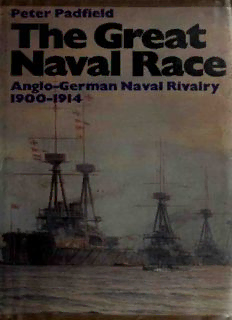
The Great Naval Race : The Anglo-German Naval Rivalry, 1900–1914 PDF
Preview The Great Naval Race : The Anglo-German Naval Rivalry, 1900–1914
'eier Padfield The Great Naval Race Anglo-German Naval Rivalry I900-I9I4 ^fOfcr - This is the dramatic story ofthe deadly competition in Dreadnought battleships between Great Britain and Imperial Germany in the years before the First World War. It is a story oftwo great Empires set on a collision course, its climax the Armageddon of 1914. But was 1914, as many historians have written, the inevitable result ofthe armaments race? Peter Padfield- with the aid ofdocuments from both British and German archives- argues forcibly that the major causes ofthe First War were not the armaments themselves; rather the personalities involved especially Kaiser Wilhelm II, with his obsessive dreams ofImperial destiny- decisively influencing the course ofevents, and that there was indeed conspiracy by the German High Command. THE GREAT NAVAL RACE is a clear and compelling narrative ofthose fateful years; and the author has vividly portrayed the leading protagonists in the drama. On the German side. Kaiser Wilhelm and Admiral Tirpitz, who launched the challenge to British naval supremacy; and on the British side, the statesmen who responded to that challenge- Admiral Fisher, who dragged the British Navy into the twentieth century; Edward Grey; and Winston Churchill, who belatedly recognising the real nature ofthe German threat, turned his incomparable fire and energy into preparing the Navy for War. WITHDRAW!^ No longerthd property ofthe Boston P{Mo Library. SeIs of this matsria! benoii^sd Uio Libr; THE GREAT NAVAL RACE By the same author The Battleship Era ^TT"cft?^l3nrp^ THE GREAT NAVAL RACE The Anglo-German Naval Rivalry, 1900-1914 Peter Padfield David McKay Company, Inc., New York VA454 .P32 1974b © Copyright 1974 by Peter Padfield All rights reserved, including the right to reproduce this book, or parts thereof, in any form, except for the inclusion of brief quotations in a review. First American Edition, 1974 Library of Congress Catalog Card Number: 74 78662 ISBN: o 679 50472 9 Printed in Great Britain Viscount Eshcr to Lord Fisher, 1918; 'Memories of old days crowd upon me, and I have thought much of you these last few hours. It all seems so far away and yet so near. Where should we all be today, were it not for your foresight, your bold determination? Really, the prophets . . . were not in it with you. And what a story the whole thing would make .' . .
